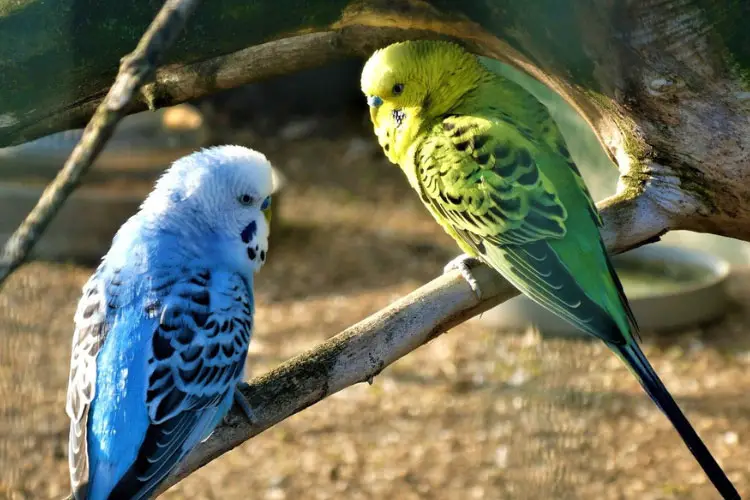If you’re curious as to how long your budgie can go without food or water, you’ve come to the right place. Parakeets have such a fast metabolism and like eating more often, so it can be hard for them to go for a long time without food or water. But exactly how long can they survive?
How long can budgies go without food and water? An adult budgie can go about 24 without food and up to 48 hours without water. If it goes longer than this, it will become quickly malnourished and dehydrated and suffer adverse effects. And in the worst-case scenario, your pet bird may perish.
In this guide, we’ll discuss more comprehensive details about how long budgies can survive without food and water. You’ll discover helpful info such as how long a baby budgie can survive without food, how often to feed your budgie, what to do if your budgie refuses to eat, and more.
How long can budgies go without food and water?
Budgies require constant food and water supply and will not hold up for long if not provided with meals. The parakeets can survive for roughly 24 hours without food (and 48 hours without water) without showing any adviser effects.
But if you continue staving them past this period of time, they’ll weaken quickly and even perish!
Your budgie usually has fats stored in its body, which gives it enough energy to last for 1-2 days without food before it starts showing signs of starving or suffering starvation-related issues such as hypoglycemia or low blood sugar.
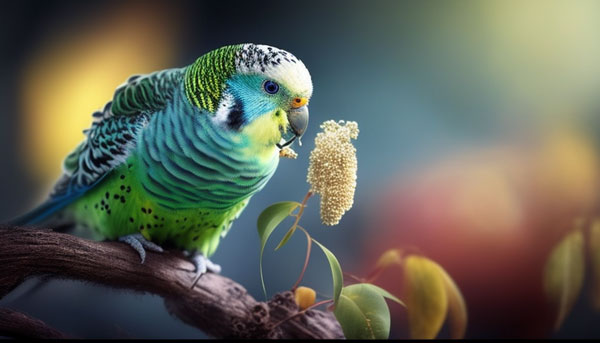
The surrounding temperatures may also play a role in how long your budgie can survive without food.
The reason your budgie is unable to hold for more than 2 days is that it has such a high metabolism rate compared to other animals. This is evident from its high frequency of eating (more details later in this post).
The metabolism is so fast that your pet bird will get ill in just 24 hours of not eating and eventually perish!
However, just because your budgie can go without food or water for the mentioned period of time doesn’t mean you should intentionally starve it. You should provide it with a balanced diet and fresh and clean water.
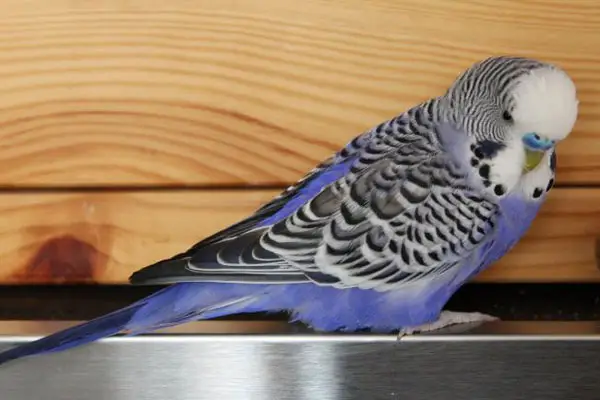
If you must make your pet bird go without food for any reason, e.g. when switching to a new type of food, then we advise you to first seek the guidance of your vet.
This is especially true if your budgie is sick or injured—you need to take good care of it, which includes ensuring it gets enough food and water.
How long can a baby budgie live without food?
Just like their adult counterparts, baby budgies have a fast-paced metabolism and can go for not more than 24 hours without food.
Generally, budgie chicks burn calories to produce energy pretty fast, which means they need to eat after every few hours. This will help support their fast-growing body.
You should feed your baby budgie around 5 to 6 times a day, after every 3-4 hours. As it becomes older, you can adjust the mealtime to be after every 4 hours.
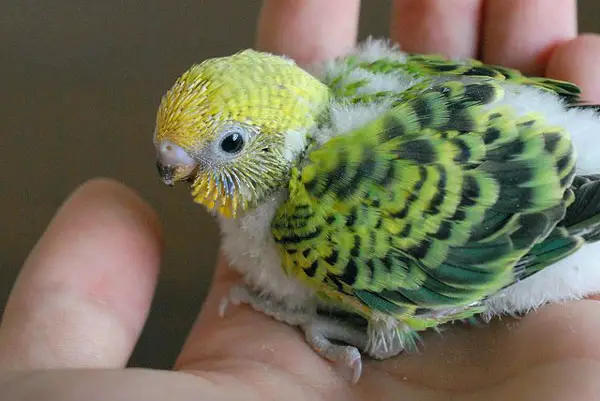
The bottom line, your baby budgie shouldn’t go 24 hours without food and water.
Otherwise, it will get sick at this point and it will start nearing the starvation line. And before you know it, things would have gotten worse to a point that your bird perishes!
Why is your budgie not eating?
Many reasons could be behind this strange behavior of your budgie refusing to eat. One such issue is if you introduce your budgie to new food incorrectly.
This usually happens to budgie owners who switch from seed-only to a more balanced diet. Budgies generally love seed-based diets and may be reluctant to try new foods.
Your budgie may also refuse to eat if its feeding dish is unclean or messy. If you don’t clean up your bird’s poop or scrub down any perches, it will easily put off your birds and make them go on a hunger strike.
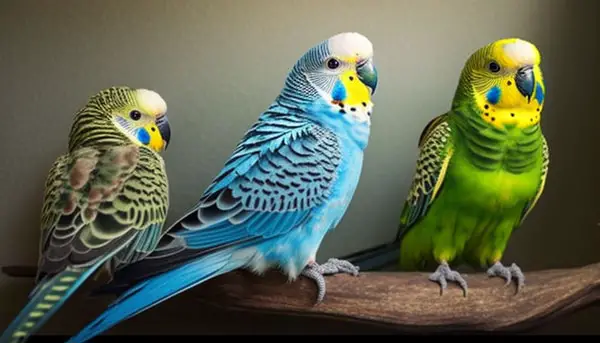
If the feeding fish contain rotting or moldy food, your budgie may also refuse to eat it.
Injuries that are causing it too much pain and affecting its appetite or making it impossible to ea. Illnesses (loss of appetite is one of the signs of viral infections in parakeets) can also make your pet bird lose its appetite.
Other reasons why your budgie may not be eating include stress and hostility from other budgies, especially in cages where many budgies are crowded and the resources are limited.
What should you do if your budgie is not eating?
If your budgie won’t eat, try changing its diet by offering a variety of meals including nuts, seed varieties, pellets, fruits, and veggies.
If this doesn’t work, look out for various signs of an ill budgie including feather loss, excessive sleeping, lethargy, trouble breathing, and tail bobbing.
You may also want to check if there are bullies in your budgie’s cage preventing your budgie from eating.
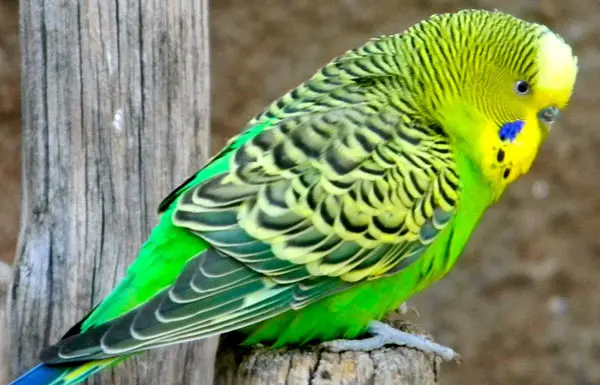
Also, ensure you house your budgie in a calm and quiet area, free of stressors such as human traffic, and see if it will start eating.
If none of these tricks work and you suspect your budgie is unwell, separate it from its fellow birds and contact your vet immediately.
How often should you feed your budgie?
You should feed your budgie daily to maintain its energy levels. Make sure you feed your adult budgie around 3-5 times a day. Or better off, make sure it has food in its cage throughout the day. You can fill it in the morning and in the evening.
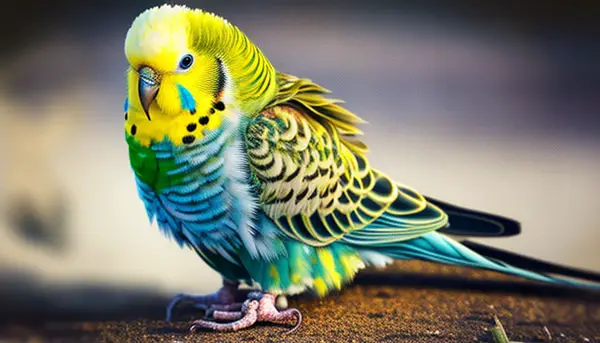
A baby budgie will need to eat even more frequently as it has energy per pound compared to its adult relatives.
This is to its high energy consumption rates which makes it burn the food they eat pretty quickly and feel the urge to eat more to keep them going.
With this in mind, it’s best to ensure there’s always food in their cage so they can peck it throughout the day.
Parakeets generally don’t have mealtimes but need to eat consistently throughout the day, whenever they feel like it. Even if you add its dish once in the morning, be sure to check it at least once in the day to ensure your budgie still has some food to eat.
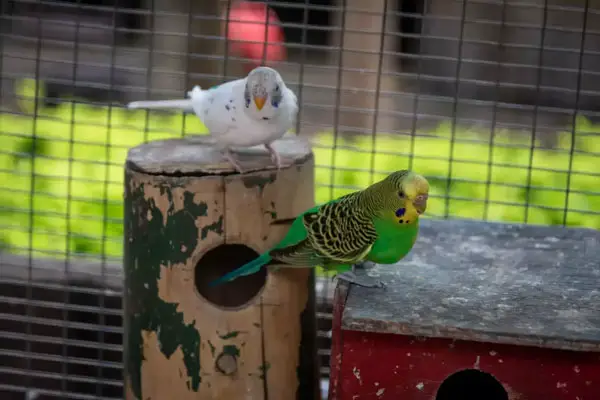
Even better, you can get an automatic feeder that automatically drips food into the dish when it gets depleted, ensuring your pet bird has access to food throughout the day.
How much food does a budgie need?
You should feed your adult budgie around one tablespoon of seeds per day while baby budgies will consume around half to a teaspoon of seeds.
Vegetables and fresh fruits should also be provided as part of the parakeet’s daily diet.
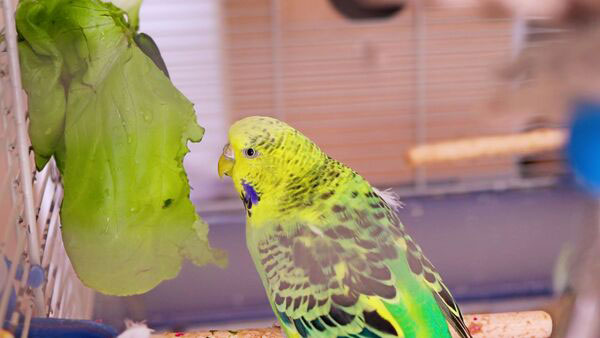
Keep in mind that your budgie can be a picky eater and tends to eat only the top layer of the food.
As such, you should consider feeding them in a shallow dish to help minimize the depth and increase the seeds’ surface area—encouraging your budgies to eat more!
How much water should you feed your budgie?
You should give your budgie about a teaspoon of water daily. However, note that there are no specific data that explains how much water budgerigars should drink.
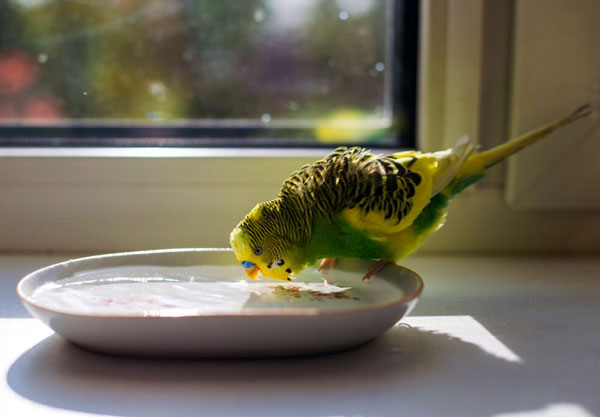
The amount of water the bird takes may depend on the surrounding temperature, how active it is, etc. Simply proved your budgie with clean, fresh water in its water bowl every day and it will drink to its fill.
Can you leave a budgie alone for a weekend?
Just because we said that parakeets eat more frequently doesn’t mean you shouldn’t step out on a weekend. You just need to provide your bird with enough food for the weekend and that’s it!
Unlike other pets such as dogs, you can prepare enough food and water for your budgie for the weekend and not have to worry about them eating all of it at a go.
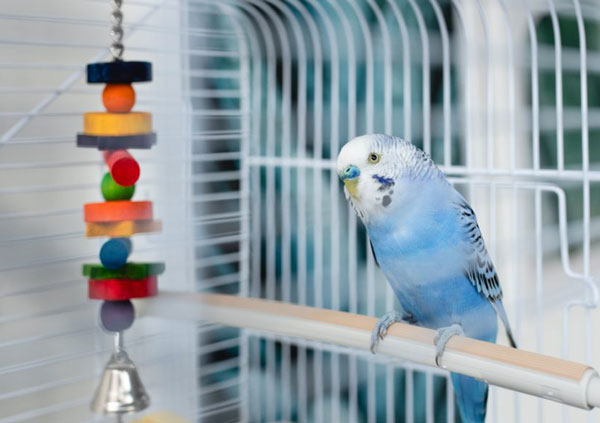
You can get unique weekend feeders or automatic feeders that release bird food slowly for your feeders, keeping them nourished for the weekend.
FAQs:
You can tell if your budgie is dehydrated by inspecting its eyes. If they look sunken and the skin surrounding them is wrinkled, then your budgie may be dehydrated.
A parakeet can unintentionally starve itself to death if it feels the food provided is unsafe for it to eat or if it doesn’t like its food.
Final Verdict
Budgies can’t survive for long without food or water. The longest your little friend can go without water is about 24 or a day and around 48 hours without water. If you don’t feed it after this period, its body will become ill, and eventually perish. We advise against intentionally starving your budgies as a balanced diet is essential for their good health and well-being.
Hopefully, this guide has taught you key insights into why budgies can’t survive for long without food and what’s likely to happen if you starve your parakeets. Follow the tips we’ve discussed in this guide on the right amount of food for your budgie and how often to feed it to keep your budgie healthy at all times.
